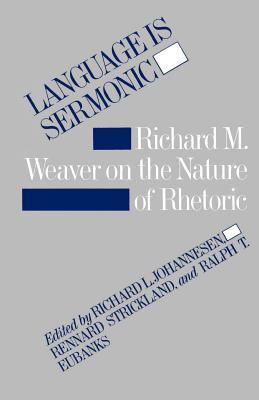Richard M. Weaver believed that "rhetoric at its truest seeks to perfect men by showing them better versions of themselves." Language is Sermonic offers eight of Weaver's best essays on the nature of traditional rhetoric and its role in shaping society. Arguing throughout the book against society's reverence for relativism--and the consequential disregard for real values--this philosophical idealist uses his southern background and classical education as a backdrop for his scrutiny of our misuse of language.
Weaver argues that rhetoric in its highest form involves making and persuasively presenting choice among goods. He condemns such supposedly value-free stances as cultural relativism, semantic positivism, scientism, and radical egalitarianism. Eschewing such peripheral aspect s of rhetoric as memorization and delivery, aspects too often now presented as the whole, Weaver deals instead with the substance of rhetoric. Ideas and the words used to express them--these are Weaver's subjects. Anyone concerned about language--its use and abuse in contemporary society--will find Language is Sermonic provocative and rewarding. The editors' critical interpretation of all of Weaver's writing, as well as Ralph Eubanks' brief appreciation of Weaver, make this a book no student of language and ideas should be without. Richard M. Weaver was one of the most stimulating and controversial rhetorical theorists of our time. He taught for many years at the University of Chicago and was the author of several books, including Visions of Order, Ideas Have Consequences, The Ethics of Rhetoric, and Life Without Prejudice and Other Essays.
Book
Language Is Sermonic: Richard M. Weaver on the Nature of Rhetoric
(Write a Review)
Paperback
$30.00
Richard M. Weaver believed that "rhetoric at its truest seeks to perfect men by showing them better versions of themselves." Language is Sermonic offers eight of Weaver's best essays on the nature of traditional rhetoric and its role in shaping society. Arguing throughout the book against society's reverence for relativism--and the consequential disregard for real values--this philosophical idealist uses his southern background and classical education as a backdrop for his scrutiny of our misuse of language.
Weaver argues that rhetoric in its highest form involves making and persuasively presenting choice among goods. He condemns such supposedly value-free stances as cultural relativism, semantic positivism, scientism, and radical egalitarianism. Eschewing such peripheral aspect s of rhetoric as memorization and delivery, aspects too often now presented as the whole, Weaver deals instead with the substance of rhetoric. Ideas and the words used to express them--these are Weaver's subjects. Anyone concerned about language--its use and abuse in contemporary society--will find Language is Sermonic provocative and rewarding. The editors' critical interpretation of all of Weaver's writing, as well as Ralph Eubanks' brief appreciation of Weaver, make this a book no student of language and ideas should be without. Richard M. Weaver was one of the most stimulating and controversial rhetorical theorists of our time. He taught for many years at the University of Chicago and was the author of several books, including Visions of Order, Ideas Have Consequences, The Ethics of Rhetoric, and Life Without Prejudice and Other Essays.Paperback
$30.00